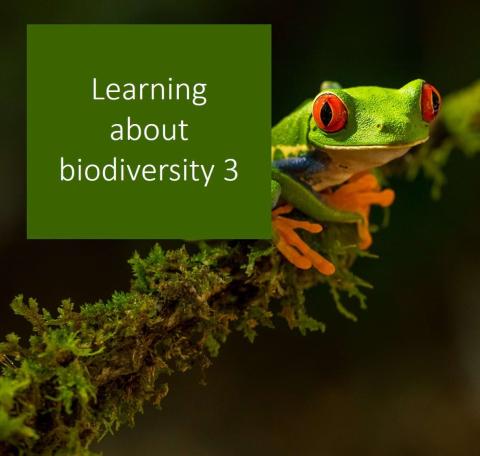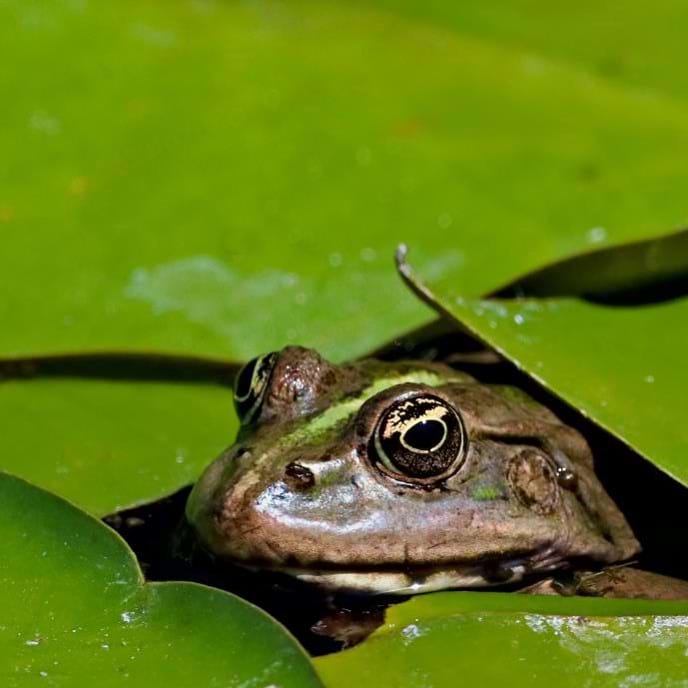E-Learning opportunities on biodiversity in business, finance, and law

Last edited 31 May 2024 (note that additional links were added; earlier content was not checked for updates at this time).
How is biodiversity relevant to business, including finance? What are some of the international legal frameworks on biodiversity? Fortunately, we now have plenty of learning opportunities to choose from. This blog post was inspired by an ONet Caucus Day: thank you to ONet's many dedicated volunteers!
This is the third in a series: scroll down for links to parts 1 and 2. You may want to read this post together with part 2, which includes further topics relevant to action for biodiversity in sustainable business.

Taking action with IPBES
A joint report by IPBES and IPCC unequivocally showed that biodiversity loss and climate change are inseparable threats: meaningful sustainability strategies will address both.
The final version of each IPBES assessment report comes with a summary for policy makers: these shorter publications are designed for readers who are new to the topic, and they're available in all six UN languages. To support readers, IPBES also provides an online glossary.
In addition to the Global Assessment, IPBES reports cover
- dedicated assessments of your world region(s).
- business-critical ecosystem services, such as pollination, protection of lands and soils, and the provision of wild species for human use.
- key methods, such as modelling biodiversity and ecosystem services and the valuation of nature.
Watch the IPBES website for the latest news on ongoing assessments, including
- the dedicated assessment on business and biodiversity.
- the links between biodiversity, water, food and health.
- options for transformative change on biodiversity.
Online courses
Given the thousands of online courses available today, this blog can only provide a small selection. The main selection criteria were
- reputable providers. The series seeks to be transparent about course providers throughout. Given the ongoing discussion among stakeholders around biodiversity, conservation and for-profit business, this part takes additional care to identify private sector course providers and content.
- access at no cost to you, thanks to generous providers or sponsors. Wherever possible, we opted for courses that offer not just the content, but also a certificate free of charge to learners.
Please note that it was not possible to test each course in full. Please help us improve this information by sharing your experiences in the comments.
Business for biodiversity
- Biodiversity fundamentals: The business case for action: "By completing this 60-minute foundational course you will: Learn how the biodiversity crisis impacts the private sector. Understand key biodiversity conservation approaches relevant to business. Make a business case for taking biodiversity action. Get equipped with a practical approach and real life examples for how to get started."
Recommended for business professionals at all levels. Estimated to take you 1 hour. Comes with a free certificate of completion. Offered by the UN Global Compact, developed in collaboration with the United Nations Environment Programme - World Conservation Monitoring Centre (UNEP-WCMC). For the links to the Spanish, French, and Portuguese versions, follow the link and scroll to the bottom of the page. Alternative access link.
- A Business Approach to Sustainable Landscape Restoration: "This MOOC aims to train the next generation of business professionals and developers to acknowledge business’ interdependency with healthy landscapes and understand the value of ecosystem resources."
Introductory course. Estimated to take you 25 hours. While access to the course is free, the certificate comes at a cost. Financial aid is available. Offered by Erasmus University Rotterdam. Available with subtitles in different languages; see below.
- Business Model Innovation for Sustainable Landscape Restoration: "In this MOOC we focus on the potential of business model innovation for the challenge of large-scale landscape restoration. We take a partnership approach and make a bridge between ecology and economy."
Introductory course. Estimated to take you 13 hours a week for 3 weeks. While access to the course is free, the certificate comes at a cost. Financial aid is available. Offered by Erasmus University Rotterdam. Available with subtitles in different languages; see below.
- Managing nature-related risks and opportunities with TNFD: "The market-led, science-based Taskforce on Nature-related Finance Disclosures (TNFD) framework will enable companies and financial institutions to integrate nature into decision making. Take this course to learn more about the TNFD, understand its latest framework, and why nature-related risk and opportunity management matter."
Introductory course. Estimated to take you 1 hour. No information available on certification. Offered by the UN Global Compact. For links to the French, Portuguese and Spanish versions, see below. Note that TNFD is an initiative led by for-profit industry.
- Introduction to the Natural Capital Project Approach: "This course introduces the Natural Capital Project’s (NatCap’s) approach to using ecosystem service information to inform decisions. It uses specific examples to illustrate how the approach has worked in each case and highlights key methods and tools used in implementation."
Introductory course. Estimated to take you 2-3 hours a module for 4 modules. While access to the course for 4 weeks is free, access for longer and a certificate come at a cost. Offered by Stanford University. For the link to the Spanish version, see below.
- Valuing nature and people to inform business decision-making: "The aim of the course is to introduce businesses employees to the Capitals Approach and help them to get started with integrating natural, social and human capitals into business decision-making."
Introductory course. Estimated to take you 19 hours. While access to the course is free, the certificate comes at a cost. Financial aid is available. Offered by the Capitals Coalition. Note that the Capitals Coalition includes for-profit industry alongside NGOs, intergovernmental organizations, etc. among leading coalition partners.
- An Introduction to Nature, Business and Finance: "You will learn about the economic and financial imperative of nature, what nature-related dependencies, impacts, risks and opportunities are, how these nature-related issues relate to climate-related issues and the broader landscape of corporate reporting on nature-related issues."
Introductory course. Estimated to take you 1-2 hours a module for 3 modules. Comes with a free certificate of course completion. Offered by the United Nations Development Programme (UNDP) with contributions by the Taskforce on Nature-related Financial Disclosures (TNFD). Note that TNFD is led by for-profit industry.
- Designing for Environmental Sustainability and Social Impact: "Develop entrepreneurial solutions that promote environmental conservation and address problems of poverty."
Introductory course. Estimated to take you several hours a week over 6 weeks. Comes with a free certificate. Offered by the Acumen Academy and produced with the support of the MAVA Foundation.
- Environmental, Social & Governance (ESG) Training for SMEs: "You’ll learn how to enable SMEs understand the relevance of environmental, social and governance considerations to their enterprises’ very existence and overall sustainability."
Intended for SMEs in all sectors, especially for decision makers like shareholders, directors and executives. Estimated to take you about 8 hours. Comes with a free certificate of completion. Offered on a learning platform implemented by the German GIZ. Note that GIZ is a for-profit company that mainly works for the German Federal Ministry for Economic Cooperation and Development (BMZ).
- Sustainability: An Introduction to ESG (Environmental, Social and Governance): "Learn what Environmental, Social and Governance is and how it could transform your approach to ethics and the environment."
Introductory course. Estimated to take you 3 hours a week for 2 weeks. While the course can be accessed for free for 2 weeks, longer access and a certificate come at a cost. Offered by the chartered Association of Corporate Treasurers.
- Sustainable Commodity Supply Chains: "This course introduces the concept of sustainable commodity supply chains (SCSC). It will also support you to identify how SCSC principles can be integrated into biodiversity and development planning and implementation in order to mainstream conservation values into key production sectors."
No description of the level provided. Estimates for this course vary from 1 hour 45 minutes to 3 hours. Comes with a free certificate. Offered by the NBSAP Forum. Also available on ConservationTraining.org, where it is part of a series on National Biodiversity Strategies and Action Plans. For links to the French and Spanish versions, see below.

Biodiversity finance
- Introduction to Finance for Nature: "What are the financial implications of nature loss or nature conservation? Enrol to this free introductory course to start your journey in understanding the economic importance of nature and the related risks and opportunities."
Introductory course, recommended for professionals in the private and public sectors. Estimated to take you 1-2 hours. Comes with a free certificate. Please note that the course information is only accessible after you create an account and log in. Offered by IUCN. IUCN Academy also offers the IUCN Professional Certificate on Finance for Nature that is not otherwise included in this list, as access is limited and comes at a cost.
- Biodiversity Finance: "This course will provide you with the tools to assess the policy, institutional, and economic context for biodiversity finance; conduct a financial needs assessment to achieve a country’s biodiversity goals; and develop a biodiversity finance plan that identifies the most suitable finance solutions. [...]"
Recommended for conservation planning and biodiversity finance practitioners and policymakers, but open to everyone. Estimated to take you 14 hours. Comes with a free certificate. Offered in collaboration by UNDP, UNDP Biodiversity Finance Initiative, NBSAP Forum, CBD, and OECD.
- Green Fiscal Policy: "The course sets out to provide interested participants [...] with an introduction to the green fiscal policy tools and approaches to foster a more sustainable future."
Introductory course, recommended for participants from government, business, and civil society. Estimated to take you 2 hours. Comes with a free certificate of completion. Developed by the Partnership for Action on Green Economy (PAGE), a collaboration of five UN agencies.
- Introduction to Sustainable Finance: "This course presents key elements of sustainable finance, such as green bond markets and other tools."
Recommended for participants from governments, the financial sector, businesses, and civil society. Estimated to take you 2 hours. Comes with a free certificate. Offered by the Strategic Alliance on Green Bond Market Development in G20 Emerging Economies. Note that the Strategic Alliance is between GIZ, a for-profit company that mainly works for the German Federal Ministry for Economic Cooperation and Development (BMZ), and SEB, a Swedish private bank.
- Introduction to Sustainable Finance 2.0: "This interactive and practice-oriented course, originally developed in 2018 and comprehensively updated in 2021, covers the basics of Sustainable Finance while providing several opportunities to dive deeper."
Recommended for participants from governments, academia, the financial sector, businesses, and civil society. Estimated to take you 10 hours. Comes with a free certificate. Offered by the Strategic Alliance on Green Bond Market Development in G20 Emerging Economies. Note that the Strategic Alliance is between GIZ, a for-profit company that mainly works for the German Federal Ministry for Economic Cooperation and Development (BMZ), and SEB, a Swedish private bank.
- Sustainable financing of Forest and Landscape Restoration: "This course has been developed to improve the awareness and capacities of practitioners and policy makers to analyse FLR financial needs and opportunities, so that they are more effective at securing and coordinating funding for FLR interventions."
No information on the level given. Estimated to take you 2 hours and 15 minutes. Comes with free digital certification. Offered by the Food and Agriculture Organization of the United Nations. For the link to the French version, see below.
- Landscape Finance: Investing in Innovation for Sustainable Landscapes: "Bridge the gap between finance and landscape! Learn to navigate the web of landscape financial flows, mechanisms and requirements toward developing cutting-edge business cases and models for sustainable development in landscapes."
Intermediate course, recommended for those with a BA/BSc or higher-level certificate in financial/business/economic fields or social sciences and a minimum of one year's academic or professional engagement in landscapes or development finance. Estimated to take you 1-3 hours a week for 4 weeks. While the course is available for free, the certificate comes at cost. Offered by Wageningen University & Research with support from the Global Landscapes Forum. This course is part of the Sustainable & Inclusive Landscapes Professional Certificate that is not otherwise included in this list, as full participation comes at a cost.
- UNDP Training on Nature Performance Bonds: The next vista of nature and climate financing: "In this self-paced course, you will learn about nature performance bonds including what they are and how they can be issued as a means to finance actions to deliver on environmental goals while supporting in the administration of national debt."
Introductory course open to everyone; "this course is geared towards ministries of finance, ministries of budget and planning, ministries for environment, and ministries of other sectors that are prioritized in the countries’ NDC (energy, forestry, agriculture, transport, waste, etc.), national and regional banks, financial sector regulators, finance institutions, investment banks, commercial banks as well as UNDP staff." Estimated to take you 2 hours each week, and a total of 6 modules; no information on the overall duration given. Comes with free digital certification. Offered by Learning for Nature, a UNDP e-learning programme. For the link to the Spanish version, see below.
- Introduction to Corruption, Anti-Corruption and Natural Resource Management: "designed to provide an overview of basic anti-corruption concepts and considerations."
Introductory course for conservation and natural resource management practitioners working in the wildlife, forests, and fisheries sectors. Estimated to take you 1.5 hours. No information on certification given. Offered by TRAFFIC. See below for the links to the Spanish and French versions. Also see the introductory course on CITES below. For related courses, see the TRAFFIC Learning Centre. Note that the course 'Law Enforcement' listed below also includes a module on corruption.
Illegal harvesting and trade in wild species often lead to unsustainable use, according to the IPBES Sustainable use of wild species assessment:
- Engaging the financial sector to reduce money-laundering and corruption linked to wildlife trade: "Corrupt practices distort good governance, undermine the sound management of natural resources, facilitate environmental crime and illegal trade, and drive resources away from the public good and into private hands."
Introductory course; designed for staff working in the conservation and natural resource management sector on project design and implementation. Estimated to take you 2 hours. No information on certification given. Developed by the TNRC team at TRAFFIC and piloted with staff from TRAFFIC, WWF, TraCCC, Basel Institute on Governance, and USAID. Also see the introductory course on CITES below. For related courses, see the TRAFFIC Learning Centre.

Biodiversity in international law
- Introduction to Environmental Law and Policy: "Environmental law may be the one institution standing between us and planetary exhaustion. It is also an institution that needs to be reconciled with human liberty and economic aspirations. This course considers these issues and provides a tour though existing legal regimes governing pollution, water law, endangered species, toxic substances, environmental impact analyses, and environmental risk."
Introductory course. Estimated to take you 4 hours a week for 3 weeks. While the courses are available for free, the certificate comes at cost. Financial aid is available. Offered by the University of North Carolina at Chapel Hill. Available in 22 languages, either with synchronisation or subtitles.
International legal frameworks
- Diploma on the International Legal Framework on Biological Diversity. For the overall duration, see the course list below. No information on the level provided. Offered by the United Nations Information Portal on Multilateral Environmental Agreements. You can also take the diploma's courses individually and receive a free certificate for each:
-
Introductory Course to the Ramsar Convention on Wetlands. Estimated to take you 2 hours.
-
Introductory Course to the International Treaty on Plant Genetic Resources for Food and Agriculture. Estimated to take you 1.5 hours.
-
Introductory Course to the Nagoya Protocol on Access to Genetic Resources and the Fair and Equitable Sharing of Benefits. Estimated to take you 45 minutes.
-
Introductory Course to Cartagena Protocol on Biosafety. Estimated to take you 1 hour.
-
Introductory Course to the Convention on Migratory Species (CMS). Estimated to take you 2 hours.
-
Introductory to Access and Benefit Sharing. No time given.
-
Introductory Course to the Convention on International Trade in Endangered Species of Wild Fauna and Flora (CITES). Estimated to take you 1.5 hours. For further e-learning on CITES, see the TRAFFIC Learning Centre.
-
Introductory Course to Convention concerning the Protection of the World Cultural and Natural Heritage. Estimated to take you 1 hour.
-
Introductory Course to the Convention on Biological Diversity (CBD). Estimated to take you 2.5 hours.
-
Farmers´ Rights in the International Treaty on Plant Genetic Resources for Food and Agriculture. Estimated to take you 3 hours.
-
Scientific and Technical Review Panel (STRP) Induction Training. Estimated to take you 1 hour.
-
-
E-learning course on the Nagoya Protocol: Learn about the core requirements of the Nagoya Protocol and the steps to take to build legal frameworks to implement it. Eight modules; no time estimate provided. No information on certificates available. Offered by the International Development Law Organization (IDLO). For the link to the Spanish version, see below. Note that the English version seems inaccessible as of May 2024; the provider has been contacted.
-
Introductory Course to the International Legal Framework on Marine Biodiversity. No information on the level provided. Estimated to take you 3 hours. Comes with a free certificate. Offered by the United Nations Information Portal on Multilateral Environmental Agreements. This course is part of the Diploma on the International Legal Framework on Freshwater Resources.
-
Introductory Course to Marine Biological Diversity of Areas Beyond National Jurisdiction. No information on the level provided. Estimated to take you 3 hours. Comes with a free certificate. Offered by the United Nations Information Portal on Multilateral Environmental Agreements. This course is part of the Diploma on the International Legal Framework on Freshwater Resources.
-
Introductory Course to the International Treaty on Plant Genetic Resources for Food and Agriculture. No information on the level provided. Estimated to take you 1.5 hours. Comes with a free certificate. Offered by the United Nations Information Portal on Multilateral Environmental Agreements. This course is part of the Diploma on the International Legal Framework on Agriculture, Land Degradation and Soil Protection.
- Farmers´ Rights in the International Treaty on Plant Genetic Resources for Food and Agriculture. No information on the level provided. Estimated to take you 3 hours. Comes with a free certificate. Offered by the United Nations Information Portal on Multilateral Environmental Agreements. This course is part of the Diploma on the International Legal Framework on Agriculture, Land Degradation and Soil Protection.
International legal frameworks in practice
- Law enforcement: "Law and regulations enforcement is one of the key aspects of protected area management. It relies on the implementation of specific processes that reduce or eliminate threats to protected area values. Law enforcement requires understanding, learning and applying specific knowledge and techniques. What is law enforcement? What are its implications? How to implement it and what are the traps to avoid? What are its limits and strengths? How does it help improving protected area management? These are just some of the questions that will be addressed in this MOOC."
Introductory course. Estimated to take you 40 hours to complete. Comes with a free certificate of success upon achieving a minimum grade. Developed by IUCN-PAPACO (African Protected Areas & Conservation Program of the International Union for Conservation of Nature) and its partners. For the link to the French version, see below. This course is part of the free Online Certificate in Protected Area Conservation granted by Senghor University upon passing a proctored exam. Note that the course is usually open twice a year; for updates subscribe to the mailing list.
You might also be interested in the courses 'General Fisheries Legal Framework,' and 'Protected Areas Management in Africa' that covers several multilateral environment agreements in practice, listed in part 2 of the e-learning catalogues.

Further courses on intellectual property
While several of the courses above are relevant to intellectual property, the following courses provide further information.
- DL-101 General Course on Intellectual Property (version 2). Introductory course; for an easier start, first take course DL-001 Primer on Intellectual Property that is also available from WIPO. Estimated to take you 55 hours spread over 6.5 weeks. Comes with a free certificate following a timed examination. Offered by the World Intellectual Property Organization several times throughout the year. Available in other languages, as listed below. In addition to commonly known forms of intellectual property like patents, this course also introduces geographical indications, plant variety rights, and traditional knowledge, traditional cultural expressions and genetic resources.
- Learning Plan: Plant Varieties in the European Union. Introductory series of courses. Estimated to take you about 2.5 hours. Comes with a free certificate. Offered by EU Intellectual Property Office. The learning plan includes the following courses:
- Legal Proceedings before the CPVO and before its Board of Appeal.
- Plant Variety Rights: insights and tips for enforcers.
- Enforcement of IP protected horticultural produce.
- Learning Plan: Geographical Indications in the European Union. Series ranging from introductory to intermediate courses. Estimated to take you a little over 6.5 hours. Comes with a free certificate Offered by EU Intellectual Property Office. The learning plan includes the following courses:
- Protection of geographical indications in the European Union.
- Protected Geographical Indications and Protected Designations of Origin. This course is available with a separate free certificate.
- Protecting non-EU Geographical Indications in the EU.
- Introduction to the Geneva Act & Lisbon System for the International Registration of Appellations of Origin and Geographical indications.
- GIs as a basis of opposition. This course is available with a separate free certificate.

Courses in languages other than English
If you know of more courses in languages other than English, please share them with us in the comments.
- The course on biodiversity fundamentals: the business case for action described above is also available in Spanish, French and Portuguese: follow the link to the English version and scroll to the bottom of the page.
- The French version of the course on managing nature-related risks and opportunities with TNFD described above: Gérer les risques et les opportunités liés à la nature avec TNFD.
- The French version of the course on sustainable financing of forest and landscape restoration described above: Le financement durable de la restauration des forêts et des paysages.
- The French version of the course on sustainable commodity supply chains described above: Chaînes d'approvisionnement durables.
- The French version of the course on Corruption, Anti-Corruption and Natural Resource Management described above: Introduction à corruption, lutte contre la corruption et gestion des ressources naturelles.
- The French version of the course on law enforcement: Application des lois.
- In French, on environmental law and protection: Droit et protection de l’environnement. Note that this course is also part of the French version of the free Online Certificate in Protected Area Conservation granted by Senghor University. Note that the course is usually open twice a year; for updates subscribe to the mailing list.
- The Spanish version of the course on managing nature-related risks and opportunities with TNFD described above: Gestionando los riesgos y oportunidades relacionados a la naturaleza con la TNFD.
- The Spanish version of the course on the natural capital approach described above: Introducción al enfoque del proyecto Capital Natural.
- The Spanish version of the course on sustainable commodity supply chains described above: Suministro Sustentables de Productos Básicos.
- The Spanish version of the course on nature performance bonds described above: Formación del PNUD sobre bonos de rendimiento para la naturaleza: El nuevo panorama de la financiación de la naturaleza y el clima.
- The Spanish version of the course on Corruption, Anti-Corruption and Natural Resource Management described above: Una Introducción a la Corrupción, la Anticorrupción y la Gestión de los Recursos Naturales.
- The Spanish version of the course on the Nagoya Protocol described above: Avanzando el Protocolo de Nagoya: Módulos de Aprendizaje Virtual.
- The Portuguese version of the course on managing nature-related risks and opportunities with TNFD described above: Gerenciando riscos e oportunidades relacionados à natureza com a TNFD.
- The course on intellectual property described above also comes in Arabic, Chinese, French, German, Japanese, Korean, Portuguese, Russian, and Spanish: DL-101 General Course on Intellectual Property (version 2).
- The course A Business Approach to Sustainable Landscape Restoration described above is also available with subtitles in Arabic, French, German, Indonesian, Portuguese (Brazilian), Spanish and Thai.
- The course Business Model Innovation for Sustainable Landscape Restoration described above is also available with subtitles in Bahasa Indonesia, French, German, Portuguese (Brazilian), and Spanish. Video subtitles only are available in Chinese (simplified), Dutch, Greek, Hindi, Italian, Japanese, Kazakh, Korean, Polish, Russian, Swedish, Turkish, Ukrainian, and Vietnamese.
- The course Introduction to Environmental Law and Policy described above is available in 22 languages, either with synchronisation or video subtitles.
This post is the third in a series:
- Part 1 covers learning opportunities about IPBES and learning opportunities in biodiversity and conservation.
- Part 2 covers information and courses on taking action for biodiversity.
- Part 3 covers learning opportunities in biodiversity law and finance.
Do you know of other courses on IPBES and biodiversity? Please add them in the comments!
Header photograph by Zdeněk Macháček.
